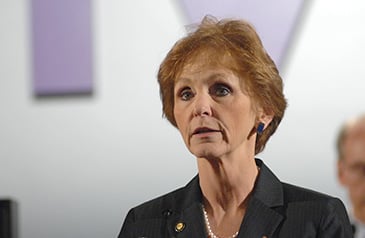Treatment, not stigmatization, should be the priority for addressing substance abuse, AMA Board of Trustees Member Mary Anne McCaffree, MD, told state legislators Thursday, emphasizing the need for evidence-based, public health practices to treat women who may be abusing drugs and increasing the risk for their babies to be born with neonatal abstinence syndrome.
Dr. McCaffree (pictured right), a neonatal-perinatal specialist in Oklahoma City, testified on behalf of the AMA before the National Conference of Insurance Legislators (NCOIL). She expressed the AMA’s support for additions to the NCOIL’s recommended best practices to combat prescription drug abuse and diversion, which generally advocate for a comprehensive approach on many areas rather than a one-size-fits-all solution.
In particular, she highlighted the AMA’s support for Tennessee’s Safe Harbor Act, signed in 2013. The act prioritizes treatment for women who suffer from substance abuse issues and are pregnant, which would help ensure the safety of both the patient and the fetus, as well as increase the likelihood of a healthy baby at birth.
On the flip side, Dr. McCaffree pointed to another Tennessee law enacted this year that undermines the patient-physician relationship—new legislation that potentially subjects a pregnant woman to criminal charges if her baby is born with withdrawal symptoms associated with neonatal abstinence syndrome.
“As a physician, I can tell you right now that if my patients knew that law enforcement was looking over my shoulder, they would be scared,” she said. “That fear is dangerous for the patient and her fetus. That fear could make the obstetric patient delay her prenatal care, or forgo it altogether, resulting in sicker mothers and preterm, ill newborns.”
Rather than forcing through legislation that may have adverse, unintended consequences, Dr. McCaffree said, the better approach is to work with the nation’s medical societies, such as the AMA, American Congress of Obstetricians and Gynecologists, American Academy of Pediatrics, and American Society of Addiction Medicine, and others who have developed educational materials and clinical guidelines.
Dr. McCaffree’s remarks echoed a recent letter the AMA sent to NCOIL regarding the update of its best practices document. In the letter, the AMA addresses neonatal abstinence syndrome, privacy issues with respect to prescription drug monitoring programs and the AMA’s support for drug take-back programs.




